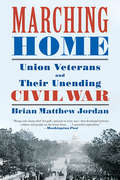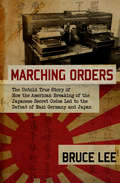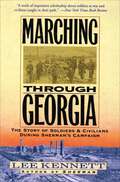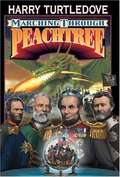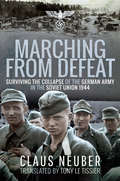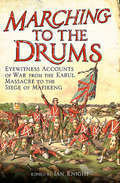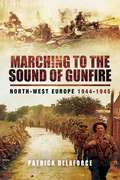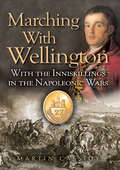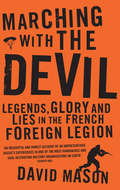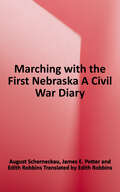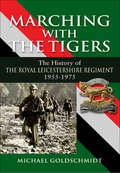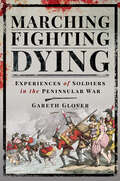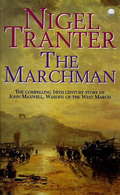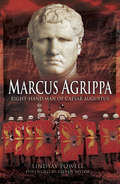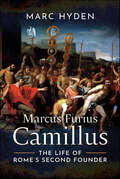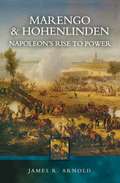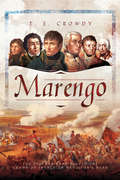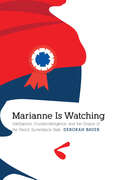- Table View
- List View
Marching Home: Union Veterans and Their Unending Civil War
by Brian Matthew JordanA groundbreaking investigation examining the fate of Union veterans who won the war but couldn't bear the peace. For well over a century, traditional Civil War histories have concluded in 1865, with a bitterly won peace and Union soldiers returning triumphantly home. In a landmark work that challenges sterilized portraits accepted for generations, Civil War historian Brian Matthew Jordan creates an entirely new narrative. These veterans-- tending rotting wounds, battling alcoholism, campaigning for paltry pensions-- tragically realized that they stood as unwelcome reminders to a new America eager to heal, forget, and embrace the freewheeling bounty of the Gilded Age. Mining previously untapped archives, Jordan uncovers anguished letters and diaries, essays by amputees, and gruesome medical reports, all deeply revealing of the American psyche. In the model of twenty-first-century histories like Drew Gilpin Faust's This Republic of Suffering or Maya Jasanoff 's Liberty's Exiles that illuminate the plight of the common man, Marching Home makes almost unbearably personal the rage and regret of Union veterans. Their untold stories are critically relevant today.
Marching Into Darkness
by Waitman Wade BeornOn October 10, 1941, the entire Jewish population of the Belarusian village of Krucha was rounded up and shot. While Nazi death squads routinely carried out mass executions on the Eastern Front, this particular atrocity was not the work of the SS but was committed by a regular German army unit acting on its own initiative. Marching into Darkness is a bone-chilling exposé of the ordinary footsoldiers who participated in the Final Solution on a daily basis. Although scholars have exploded the myth that the Wehrmacht played no significant part in the Holocaust, a concrete picture of its involvement at the local level has been lacking. Among the crimes Waitman Wade Beorn unearths are forced labor, sexual violence, and graverobbing, though a few soldiers refused to participate and even helped Jews. By meticulously reconstructing the German army's activities in Belarus in 1941, Marching into Darkness reveals in stark detail how the army willingly fulfilled its role as an agent of murder on a massive scale. Early efforts at improvised extermination progressively became much more methodical, with some army units going so far as to organize "Jew hunts. " Beorn also demonstrates how the Wehrmacht used the pretense of anti-partisan warfare as a subterfuge by reporting murdered Jews as partisans. Through archival research into military and legal records, survivor testimonies, and eyewitness interviews, Beorn paints a searing portrait of a professional army's descent into ever more intimate participation in genocide.
Marching Orders: The Untold Story of How the American Breaking of the Japanese Secret Codes Led to the Defeat of Nazi Germany and Japan
by Bruce Lee"Breaking the Japanese codes shortened the course of the war by two years." --General S. J. Chamberlin, General MacArthur's operations officer. Proclaimed "one of the most important books ever published on World War II," Marching Orders provides a stunning account of how the American military's breaking of the Japanese diplomatic Purple codes led to the defeat of Nazi Germany. Bruce Lee, having had access to more than one million pages of US Army documents and thousands of pages of daily top-secret messages dispatched to Tokyo from the Japanese embassy in Berlin, assembles fascinating revelations about pivotal moments in the war, including the reason Eisenhower stopped his army at the Elbe and let the Russians capture Berlin, the invasion of Europe, and the battles on the African and Eastern fronts. Magic and Ultra were the names of the Allied code-breaking efforts that unlocked the secrets of the Axis powers. One of the most extraordinary takeaways from these ingenious deciphering activities was the fact that Japanese leaders were intransigent in their refusal to surrender, which led to the strategic and fateful decision to drop the atomic bomb and force an end to the conflict in which thousands of lives would have been lost. This groundbreaking book clearly demonstrates how the success of the American code breakers led to so many favorable military and strategic outcomes for the Allies and hastened the end of this devastating war.
Marching Through Georgia: The Story of Soldiers & Civilians During Sherman's Campaign
by Lee B. KennettIn this engrossing work of history, Lee Kennett brilliantly brings General Sherman's 1864 invasion of Georgia to life by capturing the ground-level experiences of the soldiers and civilians who witnesses the bloody campaign. From the skirmish at Buzzard Roost Gap all the way to Savannah ten months later, Kennet follows the notorious, complex Sherman, who attacked the devastated the heart of the Confederacy's arsenal. Marching Through Georgia describes, in gripping detail, the event that marked the end of the Old South.
Marching Through Peachtree (The War Between the Provinces #2)
by Harry TurtledoveFREE THE BLONDS! (America's Civil War Turned Upside Down) A terrible civil war was tearing apart the kingdom of Detina, a land which could no longer be half serf and half free. When the new ruler, King Avram, announced his intent to liberate the blond serfs upon which the northern provinces depended, Detina was torn in two, and the rebellious north took Avram's cousin, Grand Duke Geoffrey, as their king. Neither side could expect an easy victory. The south was larger and wealthier, but the north had better soldiers and more powerful wizards. Led by officers riding unicorns, supplied by flying carpets, both sides had been clashing for three years when Count Thraxton, a conceited wizard-general whose opinions of his spell-casting ability far outstripped the reality, bungled a spell which backfired disastrously against his own side, giving the Unionists a decisive victory. But the war was far from over: Thraxton the idiot had been relieved of command; which meant that the south faced a far more competent general: Joseph the Gamecock. And Joseph and his troops were determined to hold Peachtree Province against the loyalist troops. They had occupied Rockface Rise, which offered only two narrow places where the Unionists could come at them, and had further fortified it with trenches and catapults. When the southern army attacked, they would face formidable obstacles both natural and man-made, as well as the repeating crossbows of the troops and the deadly sorcerous storm and lightning wielded by the northern wizards. Still, the very survival of Detina as one united realm was at stake, and King Avram's forces had no chance.
Marching Toward Hell
by Michael ScheuerMichael Scheuer is the author of Imperial Hubris, which was a New York Times hardcover bestseller for fifteen weeks and stirred up attention in every national and local media outlet. He is a veteran CIA counterterrorism analyst who for many years headed the Osama bin Laden unit. In Marching Toward Hell, Scheuer offers a scathing and frightening look at how the Iraq war has contributed to the enemy's strength and fundamentally changed the geopolitical landscape in a way that is harmful to U. S. interests and security concerns. Scheuer will examine the ways in which the war has widened the conflict by almost every measure, made America less secure, and left us all increasingly vulnerable to attack.
Marching from Defeat: Surviving the Collapse of the German Army in the Soviet Union 1944
by Claus NeuberIn this WWII memoir, a Nazi soldier recounts his desperate retreat from Russia, offering rare insight into the collapse of Hitler’s Army Group Central.In June of 1944, the Red Army launched a massive offensive that crushed Hitler’s forces in Belarus. German soldiers who weren’t captured had to fight their way back towards their own lines across hundreds of miles of enemy territory. This is the story of one of them, Claus Neuber, a young artillery officer who describes in graphic detail his experiences during that great retreat.Neuber’s account carries the reader through the desperate defensive battles and rearguard actions fought to stem the relentless Soviet advance and breakout from the cauldrons between Minsk and the Beresina river. After almost seventy days as a fugitive, depending on the kindness of villagers, enduring extremes of cold, wet and hunger, Neuber found his way back to the German lines. This personal narrative, translated for the first time from the original German, gives a dramatic insight into the impact of the Soviet offensive and the disintegration of an entire German army. It vividly records in day-to-day detail the experience of such a bitter defeat.
Marching to the Drums: Eyewitness Accounts of War from the Kabul Massacre to the Siege of Mafeking
by Ian KnightIn this gripping collection of first-hand accounts, Ian Knight presents the adventure of nineteenth-century warfare from the thrill of the cavalry charges at Balaklava and Omdurman, to the terror of battle against an overwhelming odds such as Rorke's Drift in the words of the men actually there.These eyewitness accounts provide a vivid and sometimes shocking insight into the brutal realities of warfare for the British imperial soldier, who fought against enemies from massed ranks of Russians and assegai-armed natives to sharp-shooting Boers, in often the most terrible conditions imaginable.These stirring tales of military adventure have been edited by Ian Knight and brought together and published in book form. Originally featured in turn-of-the-century magazine, popular during the heyday of empire, these historically valuable accounts throw considerable light on campaign conditions during Queen Victoria's colonial wars.Marching to the Drums includes accounts focusing on the experience of battle during such pivotal conflicts as the Sikh Wars, the Crimean War, the Afghan Wars, the Anglo-Zulu War, and those in China, the Sudan and South Africa.
Marching to the Sound of Gunfire: North-West Europe, 1944–1945
by Patrick DelaforceIn this exciting and revealing book, scores of British soldiers tell their amazing stories of life and death in the front line of the Allies' advance from Normandy to Hitler's Germany. In eleven months of bitter fighting between D-Day and VE Day the combined efforts of the British and their allies' armed forces ground down their ruthless enemy in the pursuit of victory. Each and every man has a unique story to tell, whether they were infantry, tank crews, gunners, sappers or in vital logistic and supporting units. Theirexperiences make for powerful and fascinating reading. First-hand accounts of the landings, liberation of towns and villages, fierce actions, not all successful, bring home to the reader the cost of war as well as the magnitude of the venture. Particularly evocative is the range of emotions that were experienced by those involved, be they generals or the most junior soldiers. The passage of time means that many of these 'voices' will be heard no more but fortunately Marching to the Sound of Gunfire captures their inspiring testimonies for posterity.
Marching with Wellington: With the Inniskillings in the Napoleonic Wars
by Martin CassidyCompiled from hitherto unpublished diaries and letters, this book tells of the dangers and rigors of life as experienced by the Infantry during the Napoleonic Wars. A superbly researched work by an expert historian, it captures the atmosphere of the era with total immediacy made possible only because the writers were actually there.
Marching with the Devil: Legends, Glory and Lies in the French Foreign Legion
by David Mason`Since its creation in 1831, the French Foreign Legion has become the stuff of myth, fiction and dreams... Anyone thinking of joining up would be well advised to read this book first? - The Sun HeraldA real-life boy's own adventure, Marching With The Devil is an account of David Mason's five years in the infamous French Foreign Legion.David Mason graduated from the Australian National University with a law degree and an honours degree. Like those around him, he could easily have settled for a life of share portfolios, good suits, new cars and big houses. But David wanted more ? he wanted a challenge, an adventure, something beyond the ordinary that would test him physically and mentally. He looked around to see what he could do. Working in an open-cut mine . . . done that. Running a marathon . . . hmm, not hard enough. Climbing Everest . . . maybe? Joining the French Foreign Legion . . . perfect!Marching With The Devil is the gripping true story of what happened when an Australian lawyer left his comfortable existence and joined the legendary French Foreign Legion. He stayed for five years and served time in the elite Parachute Regiments. With the motto 'March or Die', the legion has a history of pain, grief and glory. David Mason takes us behind the myth to reveal exactly what happens: the adventure, the danger, the drinking, the fighting and the lies that sustain the legend.fore the final choice must be made.`Remarkable... It's hard not to think it a shame that a man of such obvious gifts should have wasted them on the legion, just so as not to have to feel like a quitter, even if this book was the result? - The Age`Marching with the Devil quickly turns into an insightful and honest account of an unpretentious Aussie's experiences in one of the most ramshackle and soul-destroying military organisations on Earth? - Courier Mail`A strangely compulsive read about one man?s quest for self knowledge? - Men's Health Magazine`Mason left a comfortable life in Australia to test himself in the crucible of the legion, and he writes about it 20 years after his service time necessary to give himself the distance and context he needed to write about an extraordinary and painful experience? - Sunday Mail Brisbane
Marching with the First Nebraska: A Civil War Diary
by August ScherneckauAugust Scherneckau’s diary is the most important firsthand account of the Civil War by a Nebraska soldier that has yet come to light. A German immigrant, Scherneckau served with the First Nebraska Volunteers from 1862 through 1865. Depicting the unit’s service in Missouri, Arkansas, and Nebraska Territory, he offers detail, insight, and literary quality matched by few other accounts of the Civil War in the West. His observations provide new perspective on campaigns, military strategy, leadership, politics, ethnicity, emancipation, and a host of other topics. Scherneckau takes readers on the march as he and his comrades plod through mud and snow during a grueling winter campaign in the Missouri Ozarks. He served as a provost guard in St. Louis, where he helped save a former slave from kidnappers and observed the construction of Union gunboats. He describes the process of transforming a regiment from infantry to cavalry, and his account of First Nebraska’s pursuit of Freeman’s Partisans in Arkansas is an exciting portrayal of mountain fighting. An annotated edition that brings to bear the editors’ and translator’s respective expertise in both the Civil War and the German language, Scherneckau’s account is an important addition to primary material on the war’s forgotten theater. It will be a valued resource for historian and Civil War enthusiast alike.
Marching with the Tigers: The History of the Royal Leicestershire Regiment 1955 – 1975
by Michael GoldschmidtAs the definitive final volume of the history of The Royal Leicestershire Regiment Marching with The Tigers covers events in that Regiment and its successor, the 4th Battalion The Royal Anglian Regiment, over the years 1955-75. During this period the Battalions undertook overseas and operational tours in Cyprus, Germany, Hong Kong, Borneo, Aden, Malta and Libya, Bahrain and Northern Ireland. Supported by seventeen maps and many black and white photographs, its lively text describes the Regular battalions activities up to the disbandment of Tiger Company in 1975, the Territorial Army battalions up to the disbandment of The Royal Leicestershire Regiment (Territorial) in 1971, the early years of the Leicestershire Companies in the 5th and 7th (Volunteer) Battalions The Royal Anglian Regiment, the Depot, the Museum, the Regimental Chapel in the Cathedral and Affiliations. The final chapter brings The Tigers History right up to the present day including Royal Tigers Wood and the dedication of the various national memorials commemorating the Regiment.Its numerous appendices contain a wealth of information such as lists of Honors and Gallantry Awards (including Long Service and Efficiency Decorations and Medals), Colonels and Commanding Officers and of those who commanded other units and formations, Late Entry Commissions and National Service Officers. Marching with The Tigers is not only comprehensive but lavish as well with the four Cuneo paintings, the cap badges and the Colors all displayed in color.
Marching, Fighting, Dying: Experiences of Soldiers in the Peninsular War
by Gareth GloverGareth Glover, who has established a reputation as a leading authority on the Napoleonic Wars, uses letters sent home from the Peninsular War by British soldiers to give a candid account of what it was like to serve in the army during the long campaign against the French. The vivid excerpts, which are set in their historical context by the author’s expert commentary, are largely drawn from the correspondence of the other ranks, and they fully explore the everyday experience of these men through their own words. Only extracts from letters written during the campaigns are quoted – journals written much later for publication are discounted – so a true picture of life in the army at war comes out directly, as it was perceived at the time. Every aspect of the soldiers’ experience is covered, from the fatigue and discomfort of existence on military service to the reality of combat and their feelings when a comrade was wounded or killed. The letters reveal so much about their attitude to the enemy, civilians and the men who served alongside them. Since this was the first war in history where regular postal services operated – and since a rising number of soldiers were able to read and write – their letters offer us an insight into men at war that has never been recorded before.
Marchman
by Nigel TranterDuring the 16th century, the Borderland between Scotland and England was something of a world apart, with its own strange laws, beliefs and customs.Young John Maxwell, Warden of the West March, did his best to control a motley crew of dalesmen and mosstroopers from Liddesdale, Eskdale and Dryfesdale among others, and keep some sort of balance with the unruly West March English.As the turbulent reign of King Henry VIII gave way to the rule of Elizabeth Tudor, John Maxwell - a loyal supporter of Mary, Queen of Scots - inevitably found himself drawn into the wider sphere of the kingdom's affairs.How he fared with Mary's suitors, courtiers and enemies, and his courtship of the beautiful Agnes Herries, forms the fascinating subject of Nigel Tranter's captivating novel.
Marchman
by Nigel TranterDuring the 16th century, the Borderland between Scotland and England was something of a world apart, with its own strange laws, beliefs and customs.Young John Maxwell, Warden of the West March, did his best to control a motley crew of dalesmen and mosstroopers from Liddesdale, Eskdale and Dryfesdale among others, and keep some sort of balance with the unruly West March English.As the turbulent reign of King Henry VIII gave way to the rule of Elizabeth Tudor, John Maxwell - a loyal supporter of Mary, Queen of Scots - inevitably found himself drawn into the wider sphere of the kingdom's affairs.How he fared with Mary's suitors, courtiers and enemies, and his courtship of the beautiful Agnes Herries, forms the fascinating subject of Nigel Tranter's captivating novel.
Marcus Agrippa: Right-Hand Man of Caesar Augustus
by Lindsay PowellThe authoritative biography of the ancient Roman general and loyal deputy to Emperor Augustus by the acclaimed historian and author of Augustus at War. When Gaius Octavius became the first emperor of Rome, Marcus Agrippa was by his side. As the emperor&’s loyal deputy, he waged wars, pacified provinces, beautified Rome, and played a crucial role in establishing the Pax Romana—but he always served knowing that he would never rule in his own name. Why he did so, and never grasped power for himself, has perplexed historians for centuries. In this authoritative biography, historian Lindsay Powell offers a penetrating new assessment of Agrippa&’s life and achievements. Following Caesar&’s assassination, Agrippa was instrumental in asserting the rights of his friend Gaius Octavius as the dictator&’s heir, seeing him crowned Emperor Augustus. Agrippa then established a reputation as a bold admiral, defeating Marcus Antonius and Queen Cleopatra at the Battle of Actium, and ending bloody rebellions in the Cimmerian Bosporus, Gaul, Hispania, and Illyricum. Agrippa was also an influential statesman and architect. He established the vital road network that turned Julius Caesar&’s conquests into viable provinces, overhauled Rome&’s drains and aqueducts, and built the original Pantheon. Marrying Augustus&’s daughter, Julia the Elder, Agrippa became co-ruler of the Roman Empire until his death in 12 BC. His bloodline lived on in the imperial family, through Agrippina the Elder, his grandson Caligula, and great-grandson Nero.
Marcus Furius Camillus: The Life of Rome's Second Founder
by Marc HydenThis is the only modern biography of Marcus Furius Camillus currently available in English. Camillus served as a censor, was elected to six consular tribuneships, appointed dictator five times, and enjoyed four triumphs. He toppled mighty Veii, ejected the Senones from Rome following its sacking, and helped orchestrate a grand compromise between the patricians and plebeians. The Romans even considered him Rome’s second founder – a proud appellation for any Roman – and revered him for being an exemplar of Roman virtue. Interestingly, he never held the consulship. Plutarch stated that Camillus had avoided it on purpose, and for good reason. The office was often at the heart of controversy, given that patricians dominated it for most of Camillus’ life. The appointment of a dictator was an emergency measure taken only in the direst of situations and the fact that Camillus was repeatedly appointed speaks of a period when the young Republic was surrounded by enemies and still fighting for survival. Without Camillus’ efforts the city may never have fulfilled its great destiny. Marc Hyden sifts the fragmentary and contradictory sources and, while acknowledging that much legend and exaggeration quickly accrued around Camillus’ name, presents the story of this remarkable life as the ancient Romans knew it.
Marengo & Hohenlinden: Napoleon's Rise to Power
by James R. Arnold&“A good overview of the forces, their tactics, mistakes (and lies in official reports)&” of the two pivotal campaigns that cemented Napoleon&’s dictatorship (Paper Wars). In a tense, crowded thirty-three days in the autumn of 1799, Napoleon Bonaparte organized a coup and made himself dictator of France. Yet his position was precarious. He knew that France would accept his rule only if he gained military victories that brought peace. James Arnold, in this detailed and compelling account, describes the extraordinary campaigns that followed. At Marengo, Bonaparte defeated the Austrians and his fellow general Jean Moreau beat the combined Austrian and Bavarian armies at Hohenlinden. These twin campaigns proved decisive. Bonaparte&’s dictatorship was secure and his enemies across Europe were forced in a 15-year struggle to overthrow him.
Marengo: The Victory That Placed the Crown of France on Napoleon's Head
by Terry CrowdyOn 14 June 1800 Napoleon Bonaparte fought his first battle as French head of state at Marengo in northern Italy. Unexpectedly attacked, Napoleons army fought one of the most intense battles of the French Revolutionary Wars. Forced to retreat, and threatened with encirclement, Napoleon saved his reputation with a daring counterattack, snatching victory from the jaws of defeat. This battle consolidated Napoleons political position and placed the crown of France within his reach.Meticulously researched using memoirs, reports and regimental histories from both armies, Marengo casts new light on this crucial battle and reveals why Napoleon came so close to defeat and why the Austrians ultimately threw their victory away. With the most detailed account of the battle ever written, the author focuses on the leading personalities in the French and Austrian camps, describing the key events leading up to the battle, and the complex armistice negotiations which followed. For the first time, the author exposes the full story of Carlo Gioelli, the enigmatic Italian double agent who misled both armies in the prelude to battle.
Margarete Susman - Religious-Political Essays on Judaism (Jewish Thought and Philosophy)
by Elisa KlapheckMargarete Susman was among the great Jewish women philosophers of the twentieth century, and largely unknown to many today. This book presents, for the first time in English, six of her important essays along with an introduction about her life and work. Carefully selected and edited by Elisa Klapheck, these essays give the English-speaking reader a taste of Susman’s religious-political mode of thought, her originality, and her importance as Jewish thinker. Susman's writing on exile, return, and the revolutionary impact of Judaism on humanity, illuminate enhance our understanding of other Jewish philosophers of her time: Martin Buber, Franz Rosenzweig, and Ernst Bloch (all of them her friends). Her work is in particularly fitting company when read alongside Jewish religious-political and political thinkers such as Bertha Pappenheim, Hannah Arendt, Simone Weil, and Gertrud Stein. Initially a poet, Susman became a follower of the Jewish Renaissance movement, secular Messianism, and the German Revolution of 1918. This collection of essays shows how Susman's work speaks not only to her own time between the two World Wars but to the present day.
Margot & Me
by Juno DawsonHow can you hate someone in the present and love them in the past? Shortlisted for the Lancashire Libraries Book of the Year 2018How can you hate someone in the present and love them in the past? Shortlisted for the Lancashire Libraries Book of the Year 2018 Fliss's mum needs peace and quiet to recuperate from a long illness, so they both move to the countryside to live with Margot, Fliss's stern and bullying grandmother. Life on the farm is tough and life at school is even tougher, so when Fliss unearths Margot's wartime diary, she sees an opportunity to get her own back. But Fliss soon discovers Margot's life during the evacuation was full of adventure, mystery . . . and even passion. What's more, she learns a terrible secret that could tear her whole family apart . . .
Maria Theresa of Austria
by Margaret GoldsmithMargaret Goldsmith’s Maria Theresa of Austria is a compelling biography of one of Europe’s most remarkable and influential monarchs. As the only female ruler of the Habsburg Empire, Maria Theresa reigned from 1740 to 1780, navigating a male-dominated political landscape to transform her realm into a modernized and centralized power.Goldsmith delves into the life and reign of this formidable empress, from her unexpected rise to power following her father’s death to her determined efforts to defend and expand her empire during a period of relentless conflict, including the War of Austrian Succession. The book explores Maria Theresa’s political acumen, administrative reforms, and military strategies, all of which solidified her legacy as one of Europe’s great Enlightenment rulers.Beyond her political achievements, Goldsmith examines Maria Theresa’s personal life, including her devotion to her large family and her complex relationships with her husband, Francis I, and her children—most notably Marie Antoinette. Through rich detail and engaging storytelling, Goldsmith paints a nuanced portrait of a ruler who balanced the demands of empire with her roles as a wife and mother.Maria Theresa of Austria offers a fascinating look at a monarch whose vision and determination left an indelible mark on European history. This biography is essential reading for anyone interested in the Habsburg dynasty, the Enlightenment era, or the extraordinary lives of women who shaped the course of history.
Maria: A Novel of Maria von Trapp
by Michelle MoranNATIONAL BESTSELLER • Maria von Trapp. You know the name and the iconic songs, but do you know her real story? This dramatic novel, based on the woman glamorized in The Sound of Music, brings Maria to life as never before.&“As immersive, heartbreaking, and ultimately redemptive as the musical . . . This one is not to be missed.&”—Allison Pataki, author of Finding Margaret FullerIn the 1950s, Oscar Hammerstein is asked to write the lyrics to a musical based on the life of a woman named Maria von Trapp. He&’s intrigued to learn that she was once a novice who hoped to live quietly as an Austrian nun before her abbey sent her away to teach a widowed baron&’s sickly child. What should have been a ten-month assignment, however, unexpectedly turned into a marriage proposal. And when the family was forced to flee their home to escape the Nazis, it was Maria who instructed them on how to survive using nothing but the power of their voices.It&’s an inspirational story, to be sure, and as half of the famous Rodgers & Hammerstein duo, Hammerstein knows it has big Broadway potential. Yet much of Maria&’s life will have to be reinvented for the stage, and with the horrors of war still fresh in people&’s minds, Hammerstein can&’t let audiences see just how close the von Trapps came to losing their lives.But when Maria sees the script that is supposedly based on her life, she becomes so incensed that she sets off to confront Hammerstein in person. Told that he&’s busy, she is asked to express her concerns to his secretary, Fran, instead. The pair strike up an unlikely friendship as Maria tells Fran about her life, contradicting much of what will eventually appear in The Sound of Music.A tale of love, loss, and the difficult choices that we are often forced to make, Maria is a powerful reminder that the truth is usually more complicated—and certainly more compelling—than the stories immortalized by Hollywood.
Marianne Is Watching: Intelligence, Counterintelligence, and the Origins of the French Surveillance State (Studies in War, Society, and the Military)
by Deborah BauerProfessional intelligence became a permanent feature of the French state as a result of the army&’s June 8, 1871, reorganization following France&’s defeat in the Franco-Prussian War. Intelligence practices developed at the end of the nineteenth century without direction or oversight from elected officials, and yet the information gathered had a profound influence on the French population and on pre–World War I Europe more broadly. In Marianne Is Watching Deborah Bauer examines the history of French espionage and counterespionage services in the era of their professionalization, arguing that the expansion of surveillance practices reflects a change in understandings of how best to protect the nation. By leading readers through the processes and outcomes of professionalizing intelligence in three parts—covering the creation of permanent intelligence organizations within the state; the practice of intelligence; and the place of intelligence in the public sphere—Bauer fuses traditional state-focused history with social and cultural analysis to provide a modern understanding of intelligence and its role in both state formation and cultural change. With this first English-language book-length treatment of the history of French intelligence services in the era of their inception, Bauer provides a penetrating study not just of the security establishment in pre–World War I France but of the diverse social climate it nurtured and on which it fed.
